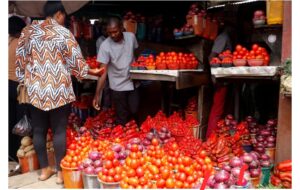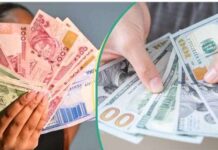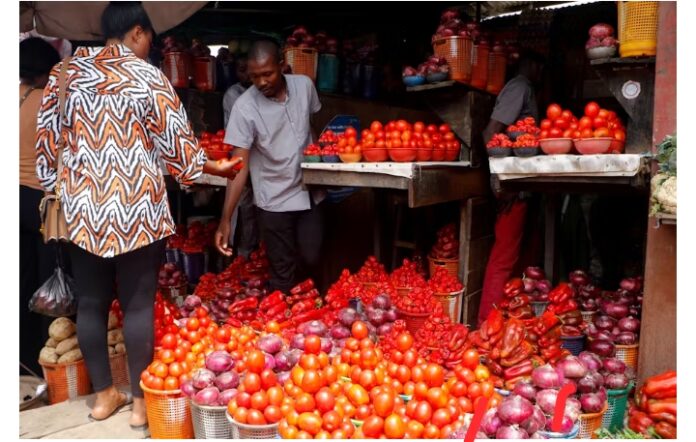Nigeria’s rising food Inflation in the mist of fallen currency

Lanre Shodimu
Food inflation no doubt forms the Core of Nigeria’s Inflationary crisis as soaring food costs in the mist of currency devaluation continue to bite harder.
As a development economist who has been studying the Nigerian economy for over four decades, I argue in this article that the factors that are pushing inflation downward in other parts of the world are moving in the opposite direction in Nigeria.
I also suggest that no single factor can adequately explain rising inflation and escalating food costs in Nigeria. Nigeria’s unprecedented inflation is a case of multiple factors interacting to trigger cost-push inflation.
If not addressed urgently, Nigeria’s rising inflation could result in “stagflation”. This is when the lack of robust economic growth is combined with hyperinflation.
With high numbers of unemployed people who must purchase basic necessities at very high prices, Nigeria risks widespread protests, social tensions and political instability.
Fuel prices
Declining oil prices, caused by a slow post-pandemic economic recovery, are causing freight prices to fall, which in turn has lowered production costs and consumer prices in many countries.
But Nigerians are not benefiting from the global decline in oil and natural gas prices. Rather, they are paying substantially more at the pump because of the removal of fuel subsidies.
Fuel prices soared, from N557 (US$0.35) to N617 (US$0.39) per litre, after the removal of the subsidy in May 2023.
In other words, while falling oil and natural gas prices are reducing production costs in other countries, costs are rising in Nigeria.
A World Bank study found that complete removal of fuel subsidies, except kerosene subsidies, increases economy-wide prices by 3.4%.
Supply constraints and inflation
Another factor that is causing global inflation to decline is the easing of pandemic-era supply chain bottlenecks, which has occurred faster than expected.
Nigeria, however, continues to endure supply constraints because of the floating of the local currency, the naira. Floating the naira means its value will from now on be determined by market forces of demand and supply, or what the Central Bank of Nigeria refers to as “the willing seller, willing buyer” exchange rate.
The central bank previously adopted a “managed floating” policy, whereby it periodically adjusted the official exchange rate. But the adjustment criteria were considered to be too opaque and un-reflective of market fundamentals.
The naira depreciated by 69% between June 2023 when the foreign exchange market was liberalised and the middle of February 2024.
Currency depreciation has increased import costs. Nigeria is an import-dependent economy, and Nigerian importers are purchasing goods at prices that are already very high abroad. The costs of these goods have also gone up because of higher tariffs caused by the depreciation of the naira.
For instance, only 1% of the roughly six million metric tonnes of wheat that Nigeria consumes annually is produced domestically. The war in Ukraine has raised food prices in Nigeria, as the country imports wheat from Russia and Ukraine, in addition to fertilizers from Russia.
Thus, much of Nigeria’s inflation is caused by a combination of oil subsidy removal and devaluation of the naira. Making it worse are longstanding supply constraints like instability in food-producing areas of the country, deteriorating rural infrastructure, climate change and the exodus of rural dwellers to urban centres in search of opportunities.
Food inflation in Nigeria also reflects low productivity in the agricultural sector. Output has failed to keep up with population growth. Nigeria’s population has been growing by about 2.4% a year, while the growth of agricultural value added is a paltry 1.8%.
Read more: Nigeria’s new foreign exchange policy is good news – but it can’t work wonders for the economy on its own
Uncertain inflationary outlook
Inflation is cooling globally partly because of the restrictive monetary and fiscal policies of many countries across the world. Central banks hiked interest rates aggressively and many governments cut spending.
Nigeria’s Central Bank governor Olayemi Cardoso expects Nigeria’s inflation rate to decline to 21.4% in 2024, following interest rate increases and rising agricultural productivity.
The steep fall in Nigerian’s inflation this year may not be too imminent.
First, inflation-targeting policies have lagged effects, and usually take time to make a difference to consumer prices.
Second, many prices are typically “sticky” downward. Once they go up they don’t come down – or only very gradually.
Lastly, Nigeria’s inflation targeting policy can only be effective if it is coupled with fiscal discipline by the executive and legislative branches of government. There is no evidence this has been the case so far under the Bola Tinubu administration.
































